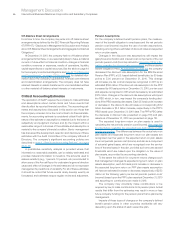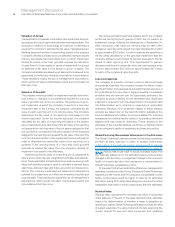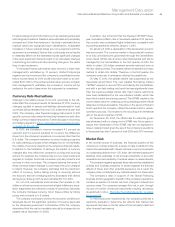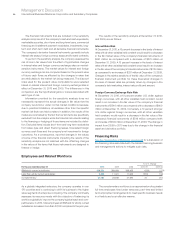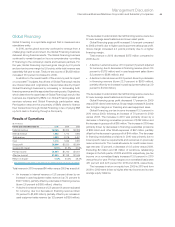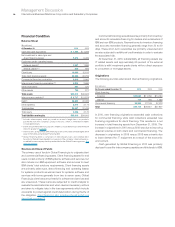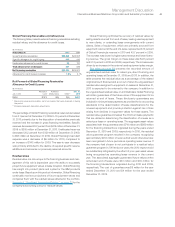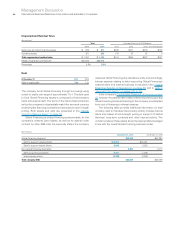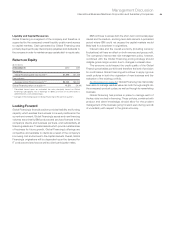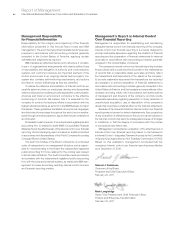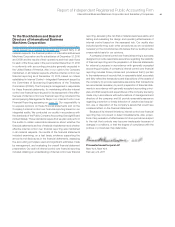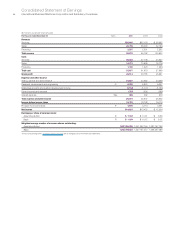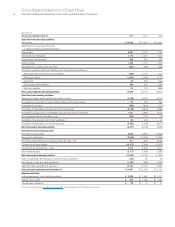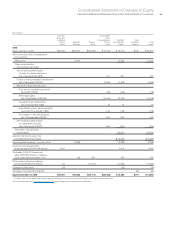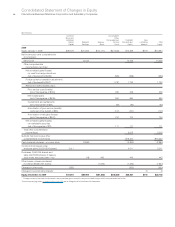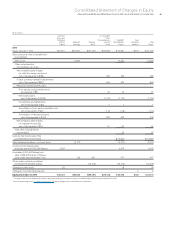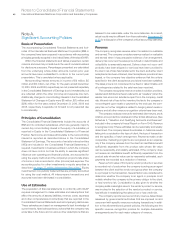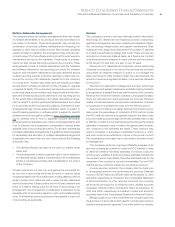IBM 2010 Annual Report Download - page 62
Download and view the complete annual report
Please find page 62 of the 2010 IBM annual report below. You can navigate through the pages in the report by either clicking on the pages listed below, or by using the keyword search tool below to find specific information within the annual report.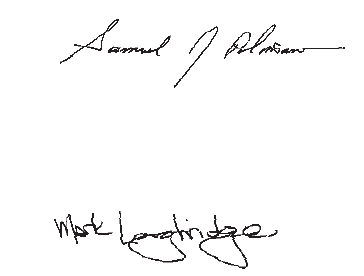
60
Report of Management
International Business Machines Corporation and Subsidiary Companies
Management Responsibility
for Financial Information
Responsibility for the integrity and objectivity of the financial
information presented in this Annual Report rests with IBM
management. The accompanying financial statements have been
prepared in accordance with accounting principles generally
accepted in the United States of America, applying certain
estimates and judgments as required.
IBM maintains an effective internal control structure. It consists,
in part, of organizational arrangements with clearly defined lines
of responsibility and delegation of authority, and comprehensive
systems and control procedures. An important element of the
control environment is an ongoing internal audit program. Our
system also contains self-monitoring mechanisms, and actions
are taken to correct deficiencies as they are identified.
To assure the effective administration of internal controls, we
carefully select and train our employees, develop and disseminate
written policies and procedures, provide appropriate communication
channels and foster an environment conducive to the effective
functioning of controls. We believe that it is essential for the
company to conduct its business affairs in accordance with the
highest ethical standards, as set forth in the IBM Business Conduct
Guidelines. These guidelines, translated into numerous languages,
are distributed to employees throughout the world, and re-empha-
sized through internal programs to assure that they are understood
and followed.
PricewaterhouseCoopers LLP, an independent registered public
accounting firm, is retained to audit IBM’s Consolidated Financial
Statements and the effectiveness of the internal control over financial
reporting. Its accompanying report is based on audits conducted
in accordance with the standards of the Public Company Accounting
Oversight Board (United States).
The Audit Committee of the Board of Directors is composed
solely of independent, non-management directors, and is respon-
sible for recommending to the Board the independent registered
public accounting firm to be retained for the coming year, subject
to stockholder ratification. The Audit Committee meets periodically
and privately with the independent registered public accounting
firm, with the company’s internal auditors, as well as with IBM man-
agement, to review accounting, auditing, internal control structure
and financial reporting matters.
Management’s Report on Internal Control
Over Financial Reporting
Management is responsible for establishing and maintaining
adequate internal control over financial reporting of the company.
Internal control over financial reporting is a process designed to
provide reasonable assurance regarding the reliability of financial
reporting and the preparation of financial statements for external
purposes in accordance with accounting principles generally
accepted in the United States of America.
The company’s internal control over financial reporting includes
those policies and procedures that (i) pertain to the maintenance
of records that, in reasonable detail, accurately and fairly reflect
the transactions and dispositions of the assets of the company;
(ii) provide reasonable assurance that transactions are recorded
as necessary to permit preparation of financial statements in
accordance with accounting principles generally accepted in the
United States of America, and that receipts and expenditures of the
company are being made only in accordance with authorizations
of management and directors of the company; and (iii) provide
reasonable assurance regarding prevention or timely detection of
unauthorized acquisition, use, or disposition of the company’s
assets that could have a material effect on the financial statements.
Because of its inherent limitations, internal control over financial
reporting may not prevent or detect misstatements. Also, projections
of any evaluation of effectiveness to future periods are subject to
the risk that controls may become inadequate because of changes
in conditions, or that the degree of compliance with the policies
or procedures may deteriorate.
Management conducted an evaluation of the effectiveness of
internal control over financial reporting based on the framework
in Internal Control—Integrated Framework issued by the Committee
of Sponsoring Organizations of the Treadway Commission (COSO).
Based on this evaluation, management concluded that the
company’s internal control over financial reporting was effective
as of December 31, 2010.
Samuel J. Palmisano
Chairman of the Board,
President and Chief Executive Officer
February 22, 2011
Mark Loughridge
Senior Vice President and Chief Financial Officer,
Finance and Enterprise Transformation
February 22, 2011


